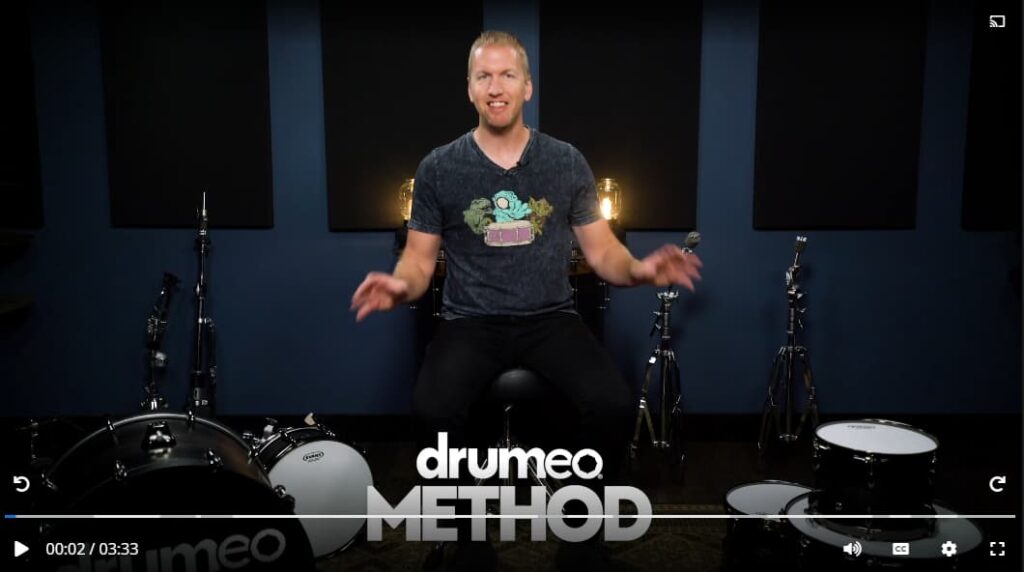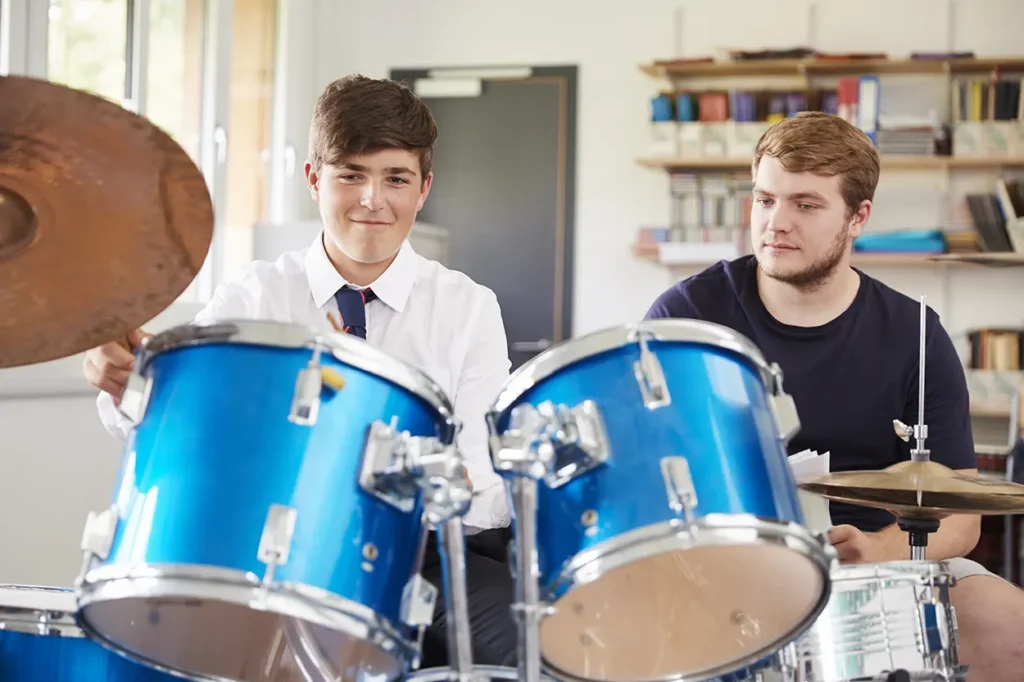Hearing your favorite song or seeing your favorite band play live can inspire anyone to learn a new instrument. However, learning an instrument, such as the drums, and how long it takes depends on the person. This is because so many different factors come into play, especially regarding the drums.
For instance, how you learn, who teaches you, and how much you practice, to name a few things. The good thing is that with the drums, there’s more than one way to learn and always an opportunity to grow.
This article is an in-depth look into what it takes to learn the drums and how you can gauge the time it takes.
What Type of Drummer Do You Want to Be
One of the first steps in determining how long it takes to learn to play the drums is to make an important decision. You have to figure out what type of drummer you want to be. If you want to play the drums for fun, just as a hobby, then it will take less time than someone who wants to be a professional drummer.
This is because once you learn how to hold the sticks and play some beginner beats on the drum kit, you can take as long as you want to develop and grow and still be a drummer.
Depending on how often you practice, becoming a beginner takes four to six months. However, to be a professional drummer, it takes months and even years of dedication and hard work. Some say it takes 10 to 20 years to be a career drummer.
You must commit to practicing consistently to master all the different rudiments and techniques. There are quite a few steps that you have to take that are mentioned below.
Finding a Drum Teacher
Finding a good teacher to learn from is critical to learning the drums for several reasons. First, they have all the knowledge you need. Therefore you have to not only be able to take direction from them, but you also have to be comfortable with them. This is key because you will be having lessons and practicing with them often, if not every day.
Due to today’s modern technology, there are a few options you can take when looking for a teacher and receiving lessons. The first option is the traditional route, having a teacher you can meet with in person one-on-one or in a group that you can interact with in real-time.
Drum teachers can see how you play in person and immediately give feedback and provide what tools you need to improve. Having someone to learn from in person also gives you a solid reason to practice every day because they can see in real-time if you’re skills are improving or not.
Drum Lessons Online
The second option is getting drum lessons online. This option is excellent for a couple of reasons. First, online lessons are a great option if you have a busy schedule and need more time to get to an in-person percussion teacher. Drumeo is the best online platform for learning the drums online.

Also, if you know of someone who plays well or is a well-respected drum teacher but is outside your area, having the ability to contact and learn from them online is clutch.
Or if you want to widen your options when finding a drum teacher, learning online broadens that number by thousands. No matter the reason learning online can be great because of the comfort of learning in your own home or familiar studio.
All the while, you are still learning and receiving the same one on one lesson experience as if you were in person.
The third option is teaching yourself. With YouTube lessons, drumming books, drum apps, and several drummers creating courses you can take at your own pace, you can learn how to play at any time that best suits you.
This is a good option because you can watch a lesson when you want, however many times you need until you feel comfortable enough to move to the next step or rudiment. It also helps you to challenge your own discipline by learning how well you can consistently practice.
Learning Rudiments, Grooves, and Fills
The most vital step to learning the drums initially is learning drum rudiments. Some drummers skip this step when teaching themselves, but I believe this is a mistake. Rudiments are essential because they help you get into good control of your sticks and set you up to do cool and creative fills and grooves on your drum kit.
Being able to play these at different tempos and even applying them when playing your kit can take months or longer, depending on how fast you can get the technique and how much you practice.
Once you get to the point of adding rudiments to your kit playing, you can learn basic grooves. These can take a few weeks to get because you have to learn how to coordinate your hands and feet while playing the rudiments. Then, you can move on to learning fills when you are good at grooves or playing in the pocket.
Fills can be more complicated and take longer to learn because you have to learn how to play the fills and know when to play fills within the grooves. However, this can be mastered over time with perfect and consistent practice.
When To Practice
The significant determining factor in how long you can learn how to play the drums is how much you practice. Practice involves training your brain to discipline itself to do something consistently until you are comfortable or feel like you’ve mastered the level that you are on.
Figuring out when and how long to practice depends on what you know about yourself. For example, are you a morning person and feel better practicing before school or work or are you better when you are done with everything else for the day and have some free time at night?
Can you focus for an hour, or are you better practicing for shorter periods, like 30 minutes a day or less? Do your wrists tire if you practice daily, or are you better a few days a week?
Once you have figured out what works best for you, you can set realistic goals. For instance, taking a rudiment and deciding you want to practice and perfect that rudiment within a week is a goal.
After about six months, you want to start learning grooves on the drum set is a goal. Deciding that you want to be on an intermediate level or play at a gig by the end of the year is a goal. Having small practice goals while learning to play the drums will eventually lead you to your objectives of being an advanced or professional drummer as long as you are consistent with your goals and stick with them.
Ways To Improve
In addition to setting goals and practicing, there are some other helpful tips and tools that can help you on your journey to learn how to play the drums. Of course, the rhythm is the most important thing when practicing rudiments or a song.
A tool that helps even the most advanced professionals is a metronome. When you are in a groove or simply enjoying what you’re playing, it’s very easy to lose the tempo of the rhythm while playing. A metronome is a machine (or you can now get an app) that keeps a steady beat going for you while you play.
When you feel confident enough, playing your favorite songs is another way to improve. Several of the most influential drummers around have said that they improved their skills by practicing to the sounds of their favorite bands.
Playing along with songs helps because it improves your timing, but most importantly, it builds your stamina. Most beginners need more stamina to play through an entire song, not to mention doing it multiple times.
The best part about practicing with songs is that if it’s a song you like, it doesn’t feel like practice. Instead, you are learning and experiencing pure enjoyment at the same time. Another way to improve goes back to something mentioned earlier, which is the use of video tutorials. Working on how you practice the drums is also equally important.
Having the ability to watch something until you can understand and master it for free is an outstanding advantage that many who have learned to play drums before didn’t have.
Conclusion
Learning the drums can genuinely be a fun experience, but at the end of the day, how long it takes depends on your motivation and commitment. Some people may learn faster than others due to how much they practice and even, for some, their natural ability.
However, putting the time into getting the techniques and using good additional resources can get you playing in no time. Some may struggle initially, but the primary key for everyone is practice. If drumming is truly something you love doing, you will be past the beginner stage and on to advancement before you know it.



